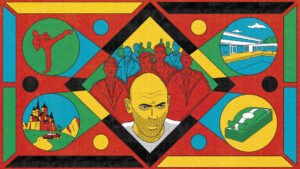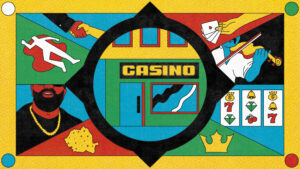It’s no secret that the family of Azerbaijani President Ilham Aliyev likes to buy expensive buildings around the world, although it’s rarely clear where the money comes from.
But the history of the US$ 7.3 million house at 39 Popa Soare Street in Bucharest’s old city is even murkier than usual, involving offshore transactions, links to corrupt officials and organized crime, insider deals and a peculiar cult of personality for a dead leader.
The house today is the headquarters of the Heydar Aliyev Foundation, a non-governmental organization set up and run by the family of the current Azerbaijani President Ilham Aliyev, the late Heydar Aliyev’s son.
Heydar Aliyev, who died in 2003 at the age of 80, was a former KGB general and first secretary of the Communist Party’s Central Committee in Azerbaijan “who for 30 years ruled his native Azerbaijan with an iron fist,” according to his obituary in the New York Times.
The elder Aliyev also developed a cult of personality around himself, which, thanks in part to the Heydar Aliyev Foundation, persists more than a decade after his death with thousands of portraits of the dead leader on billboards and official structures across Azerbaijan, often shown with his son. Scores of streets, buildings and parks bear his name, statue or image, including as many as a dozen in foreign countries.
But what, exactly, is the Heydar Aliyev Foundation, and what does it do?
In Romania, officials don’t seem to be too sure. When asked about the status of the building at 39 Popa Soare St., the Romanian Gendarmerie and the Ministry of Foreign Affairs give conflicting answers.
For example, the building is guarded round the clock by the Gendarmerie, a law enforcement branch under the Romanian Ministry of Internal Affairs.
“This is a diplomatic building,” says one of the gendarmes, asking OCCRP reporters who are filming the building to present their IDs. As he speaks two other gendarmes emerge from a side street.
When reporters ask what diplomatic mission is located in the building, they are told, “the Azerbaijani Economic Representative Offices in Romania.” When reporters ask why the building is identified as the Heydar Aliyev Foundation, a second policeman says the foundation “has a special status.”
The Heydar Aliyev Foundation says on its website that it exists due to “the nation’s wish to express its esteem for the memory of Heydar Aliyev, who entered our history as a builder of an independent state, and the necessity of reflecting his rich moral heritage, underlining the importance for our country of the philosophy of Azerbaijanism and cultivating the national statehood ideas in our children.”
The Gendarmerie says they are there to guard unspecified diplomatic interests and not the foundation headquarters. On the other hand, the Ministry of Foreign Affairs says neither the foundation nor the building have diplomatic status.
Whatever the foundation does, the building itself appears to be nothing more than another multi-million-dollar property owned secretly by the Aliyev family. Previous OCCRP and other media stories have noted their extensive purchases in London, Moscow, the Czech Republic and Dubai.
A search through business records reveals that the Bucharest house is owned by a Romanian private company in which the Azerbaijani presidential family is involved via an offshore company. That private company has placed the whole house, more than 600 square meters, at the disposal of the Heydar Aliyev Foundation, free of charge. It also enjoys tax-free status as the foundation’s home.
The building at 39 Popa Soare St., Bucharest, Romania, co-owned by Aliyev family.
AN OFFSHORE FAMILY
The members of Azerbaijan’s First Family – Ilham (head of state), Mehriban (First Lady) and their three children, Leyla, Arzu and Heydar Jr. – have been involved in numerous secretive business operations across several continents in recent years. Using offshore companies and middlemen, the First Family took over considerable chunks of the Azerbaijani economy – including gold mines, tourism, telecom companies and banks – while buying up luxury properties in various European and Gulf states.
Azerbaijani journalists who investigated and exposed the presidential family’s hidden affairs suffered retaliation. They were first targeted by smear campaigns and then imprisoned on what many rights organizations say are trumped-up charges.
As many as 80 other local activists and political opponents have been arrested after criticizing the Aliyev regime, which is fast becoming one of the region’s more repressive states.
In June 2015, the First Family was actively involved in the organization of the first-ever European Games, a pre-Olympic series of athletic events. The First Lady headed the competition’s Organizing Committee. While about 6,000 athletes participated in the competitions, most European leaders boycotted the games in protest over Azerbaijan’s worsening human rights record.
Only a handful of Eastern European officials, including Romania’s Prime Minister at the time Victor Ponta, attended the lavish opening festivities at the Heydar Aliyev Stadium in the Azerbaijani capital of Baku.
European Games opening ceremony.
The Heydar Aliyev Foundation claims that it has official partnerships with at least one ministry in Bucharest, the Ministry of Labor, Family and Social Protection. The Heydar Aliyev foundation also has a relationship with the foundation run by former Social Democrat Prime Minister Adrian Năstase, who served time in prison for corruption.
But in a letter to OCCRP the Ministry of Foreign Affairs insists there is no official partnership with the Azerbaijani foundation: “Over the time, the foundation organized a series of events and actions where different representatives of the Ministry were invited. But there is no formal cooperation agreement between the Ministry and this foundation.”
There is, however, a history of deepening ties between the countries. Romania was the second country in the world to recognize Azerbaijan’s independence after the collapse of the Soviet Union in 1991. Since then the relationship has evolved, as Romania is counting on Azerbaijan’s oil and gas to reduce its dependence on Russian gas.
President Aliyev has twice received honors in Bucharest, from both President Traian Băsescu and his predecessor, Ion Iliescu. Iliescu was among the few heads of state to meet with both Aliyevs (father and son) in their respective capacities as presidents of the Azerbaijani state.
SECRET OWNERS
According to property deeds, the house on Popa Soare Street is owned by Curzon Properties, a firm whose owners are hidden behind offshore companies. The Romanian firm, registered in Bucharest, was founded on Sept. 8, 2008 and bought the building in Popa Soare Street just two days later. Five days after that, the Heydar Aliyev Foundation moved in, rent-free. Incidentally, Curzon is the name of a gate to Hyde Park in London, just across the street from another Aliyev posh property.
The final price of the house was € 6.5 million (US$ 7.3 million), paid in full by an offshore in Seychelles, Asbet Ltd. – the majority shareholder of Curzon Properties at the time of the sale.
At the time of the sale, Asbet Ltd. was owned by Ashraf Kamilov, an Azerbaijani employee of AtaHolding and one of the shareholders in a bank owned by AtaHolding, a financial group controlled by the Aliyev family. In March 2009, Asbet Ltd. transferred its majority stake in the Romanian firm to another offshore, Ciaba Ltd., registered in the British Virgin Islands.
Documents obtained by OCCRP/RISE Project show Ciaba Ltd. was owned by none other than Arzu Aliyeva, the Azeri president’s younger daughter.
The connections between the Azerbaijanis that set up shop in Bucharest and the First Family in Baku go far beyond Romania’s borders.
Asbet and Ciaba have numerous cross ties and people in common including the Aliyev family. In March 2009, when Asbet Ltd. gave up its share of the company which owns the house to Arzu Aliyeva’s Ciaba Ltd, both companies were represented by a British consultant named Metin Guvener in Bucharest.
Guvener has ties to both parties. For nearly two years, Guvener had been a partner in the London-based Triangle Group with another Azerbaijani citizen, Gafar Gurbanov. Gurbanov was one of the managers of Ciaba.
At the same time, Gurbanov was also part of the management of AtaHolding, the First Family’s financial group.
In 2012, Asbet Ltd. owned a quarter of AtaHolding group, which was majority-owned by the First Family via a company in Panama.
Neither Gurbanov nor Guvener were reachable at their London headquarters and their representatives did not answer OCCRP/RISE Project’s questions.
In 2012, the president’s daughter reduced her stake in the Romanian business, after Asbet Ltd. paid off a € 6 million (US$ 6.7 million) loan – the final payment for the house in Bucharest.
The end result was that the First Family spent nearly US$ 7 million to buy a building to house a foundation established to honor their late patriarch.
THE BUCHAREST CONNECTION
The details of how the family of Azerbaijani President Ilham Aliyev bought a US$ 7.3 million house in Bucharest shed light on a noxious network of shady characters, insider deals and questionable transactions.
While the source of the money remains obscure, the players include several who are suspected of links to organized crime.
The house, at 39 Popa Soare St. in the old city, is home to the Romanian headquarters of the Heydar Aliyev Foundation, a charitable organization with offices in several foreign cities.
Among other things, the foundation exists to promote the memory and legacy of Heydar Aliyev, a former KGB general and 30-year ruler of Azerbaijan who died in 2003. His son Ilham is currently the country’s president.
The foundation’s Bucharest headquarters was purchased through connections to the Romania-Azerbaijan Chamber of Commerce, an organization founded by the Azerbaijani Embassy in Bucharest. Through the same network, which also includes businessmen from the Republic of Moldova, the Azerbaijani embassy spent millions of euros to have a lane in Bucharest’s Tei Park named after Heydar Aliyev.
The transactions involved a number of well-connected players:
Dobrea family. Moldovan citizen Vladlen Dobrea received the € 6.5 million (US$ 7.3 million) for the house on Popa Soare Street. He is the son of Vladimir Dobrea, the first chief executive officer of the Romanian branch of the Russian oil company Lukoil and a former mayor of the Moldovan capital Chișinău.
Balaban family. The Balaban family is a partner of the Dobrea family in several businesses. Valeriu Balaban, the head of the family, born in Chișinău, is also a member of the Romania-Azerbaijan Chamber of Commerce. Valeriu Balaban and his daughter, Natalia Balaban, owned the house on Popa Soare Street until 2004, when they transferred ownership to Dobrea Jr. The Balaban family set up the Heydar Aliyev park lane in 2007, paid for by the Azerbaijani Embassy. Valeriu Balaban was a general contractor and built gas stations for Lukoil in Romania.
Ruslan Valadov is the vice-president of the Romania-Azerbaijan Chamber of Commerce. Valadov, 46, another business partner of the Balaban family, conducted business in 2003 in the house now hosting the Azeri foundation. He was also involved in companies with other members of the Chamber of Commerce, including the current administrator of the Azerbaijani embassy Elshan Baghirov.
Alev Balgi-Curpedin is the former president of the Romanian-Azerbaijani Chamber of Commerce. Anadministrator for several companies owned by Valadov, Balgi-Curpedin served at the chamber following General Gheorghe Dragomir, who was the deputy chief of Romania’s Foreign Intelligence Service in 1990-1992.
Balgi-Curpedin then became the executive director of the International Fund for Cooperation and Partnership of the Black Sea and the Caspian Sea in Bucharest. The fund’s secretary-general is Azerbaijan’s former ambassador to Bucharest, Eldar Hasanov, who founded the Romanian-Azerbaijani Chamber of Commerce.
Cristina Trelea is a member of the Romania-Azerbaijan Chamber of Commerce, the lawyer for the Heydar Aliyev Foundation, and also for the firm that bought the house in Popa Soare Street. She also offered consultancy services to the Moldovan businessmen who sold the house. In 2007, the Aliyev family foundation registered its first headquarters in Trelea’s law office.
The Retired Spy
General Gheorghe Dragomir, the deputy chief of Romania’s Foreign Intelligence Service after the collapse of the Soviet Union, was the first president of the Romania-Azerbaijan Chamber of Commerce, between 2005 and 2007.
Before 1989, Dragomir went on missions to Asia as a Romanian spy. “I never met Heydar Aliyev,” says the general today, adding that the Chamber of Commerce was set up at the initiative of the former Azerbaijani ambassador in Bucharest, Eldar Hasanov.
Dragomir said he retired from the chamber in 2007 due to health reasons but organized economic delegations to Azerbaijan in 2005.
Dragomir said the organization started when he proposed members from Romanian companies and the Azerbaijani embassy proposed companies that operated on the Romanian market.
“I didn’t know Ruslan Valadov; I met him when the (Romania-Azerbaijani) Chamber of Commerce was set up. He didn’t work for the embassy, he was just an Azerbaijani businessman in Romania. I don’t know the Moldovans either, they came along with the people from the Azerbaijani embassy.”
The general’s house served as the first headquarters of the Romania-Azerbaijani Chamber of Commerce, but in 2007 he said he asked them to change their headquarters.
CRIMINAL INVESTIGATION
Six years later, in April 2013, the Bucharest Police searched the offices of the Romania-Azerbaijan Chamber of Commerce.
Since 2011, Romanian investigators had suspected several illicit dealings, including a money laundering case of more than € 2 million (US$ 2.3 million) involving several limited liability companies administered by the two Romania-Azerbaijani Chamber of Commerce officials. They seized documents at the firm.
One of the companies under investigation was Intelect Prestige SRL, controlled by Valadov and administered by Balgi-Curpedin’s husband Ridvan Curpedin. In 2011 Intelect Prestige, a member of the Romania-Azerbaijani Chamber of Commerce, went insolvent and had debts to the state budget. This was at the time when Balgi-Curpedin started working for the firm as a special administrator.
The investigation became public last year when a former employee of the firm, Mihai Corsate, took his former employer to court. “I sued the company because I had not imagined a company would hire a manager and then not register their work contract. They evaded the law and didn’t pay taxes, as employers, to the Romanian state. They didn’t pay anything.”
Contacted by OCCRP/RISE Project, Valadov claimed he was out of Bucharest and did not understand the questions. He also asked reporters to call him back in several days, but never returned the calls.
When asked the same questions, Balgi-Curpedin gave very few details: “I don’t understand why you need these data. I had nothing to do with the things you are talking about. I was involved for a very short period of time in the (Romania-Azerbaijani) Chamber of Commerce. But I can tell you no archive of Intelect Prestige was seized. I really do not know what information you have.”
ORGANIZED CRIME TIES
The inquiry targeted two firms on suspicion of money laundering: Stones Invest Capital and European Eye Center. The former was controlled by Valadov and administered at first by Balgi-Curpedin), while the latter was founded by Valadov and sold to the Turkish family Hacisuleymanoglu in Istanbul. Valadov remained partners with the Turkish family in other businesses in Bucharest.
The Hacisuleymanoglu family used the company to build an ophthalmology hospital in Bucharest, after signing a partnership with the British company, HCS-Providers, represented in Bucharest by Balgi-Curpedin.
The British company had been set up by New-Zealander Ian Taylor, an “offshore consultant” involved in deals with proxy businesses across the globe.
The British company was further owned by a company registered in the state of Delaware, USA.
An investigation by OCCRP in November 2010 showed how Taylor worked his global network, providing offshore services to organized crime rings from arms dealers to Mexican drug cartels.
Romanian President Traian Basescu, left, and Azerbaijani President Ilham Aliyev at the inauguration of the Azerbaijani Foundation of Bucharest. (Photo by: Mediafax/AFP/Daniel Mihailescu).
His partner in Bucharest, Romanian lawyer Kiss Laszlo, was arrested in October 2010 for embezzlement and money laundering in the Petromservice case. At that time Petromservice was a member of the Romania-Azerbaijan Chamber of Commerce.
After his man in Bucharest was arrested, Taylor delegated power of attorney to Balgi-Curpedin on behalf of the Delaware-registered company, to allow the hospital to continue functioning.
Balgi-Curpedin claims the opposite: “I had nothing to do with Ian Taylor and I really don’t want to talk about this now. (…) I am abroad, let’s talk in a few days. As for the rest, there is public information you can easily get from anywhere you like.”
She never subsequently answered calls. The British company, HCS-Providers, retired from the businesses with the Turks in the summer of 2011.
Basar Hacisuleymanoglu, 41, the administrator of the European Eye Center, was a Turkish citizen whose arrest for involvement in organized crime was ordered by Turkey in 2007. He was extradited last year at the request of Turkish authorities.
Charges brought against him by Turkish authorities include homicide, setting up an organized crime group, blackmail, deprivation of freedom, threat, and forgery.
Cristina Simion, former lawyer for the Turks, says: “Basar Hacisuleymanoglu was the only person I was in touch with. I no longer work for them. Unfortunately, the business didn’t have the success they expected, mostly once Basar was extradited.”
In front of Romanian judges, the Turk claimed he committed no crime and that he had come to Romania 10 years before as a businessman, not as a fugitive.
While he administered the hospital, Hacisuleymanoglu had gambling businesses on the side in Bucharest.
Prosecutors’ investigations into the deals involving the Azerbaijani citizen Valadov, the Turkish businessmen and the Romanian Balgi-Curpedin are ongoing.
Liquidators called on judges to order Valadov to pay from his personal wealth € 400,000 (US$ 450,000) in unpaid taxes. (P57) Valadov’s bankrupt company, Euroasia Exim, had its fiscal address in the house on Popa Soare Street back in 2003 before the Aliyev foundation settled there.
This story is dedicated to our colleague Khadija Ismayilova, a reporter for OCCRP, a RISE Project partner organization, and for Radio Free Europe. She was arrested in Baku after uncovering and reporting on the secret affairs of the Aliyev regime.



